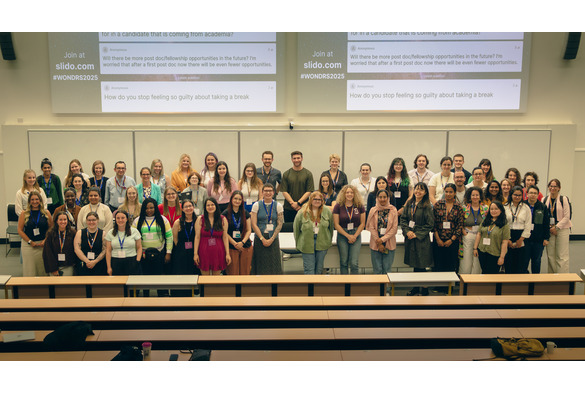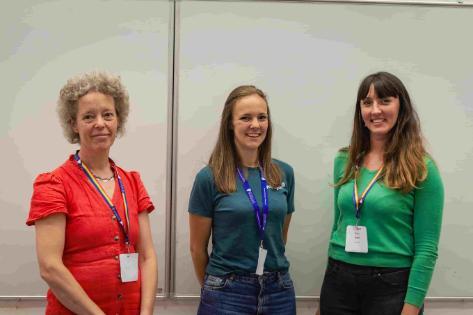
The Women and Non-Binary Doctoral Researchers in STEM (WoNDRS) Conference was held for a second consecutive year on Monday 7th July 2025 at the University of Liverpool. Researchers attended from over 25 different UK universities during the day—an impressive feat, as 2025 was the first year the conference was opened to attendees nationwide. More than 100 graduate students registered to attend the one-day meeting, and there was an air of excitement before the event commenced.
Professor Rachel Bearon opened the conference with an interesting presentation on her journey to becoming the current Executive Dean of the Faculty of Natural, Mathematical and Engineering Sciences at King’s College London. Her journey showed the audience that not all career paths need a structured plan. As the co-founder of HydRegen, Dr Holly Reeve showcased how project management is an important skill that can be gained alongside developing technical and scientific knowledge. Holly stressed how sometimes you must go against the grain to achieve what you believe in. Sustainability was at the forefront of our minds when listening to Diane Hardy, a developmental chemist at Beckers Industrial Coating Ltd. Understanding the importance of sustainable choices when producing a universal paint product were highlighted and explained.
After the morning session, attendees and contributors had a chance to peruse the posters whilst enjoying a buffet lunch. Attendees were encouraged to network and join conversations with others during the lunch break. These connections fostered a strong sense of community, achieving one of the key goals of the WoNDRS conference.

Dr Dominika Vasilkova kickstarted the afternoon presentations by showcasing both her passion for physics and undiscovered particles, and her work on investigating the muon and the importance of reviewing results and previous experimental plans. It was truly an inspiration to see Dominika’s dedication to her research. A last-minute agenda change led to Professor Tracey Berry presenting her career path to becoming the Vice-Dean of EDI for the School of Engineering, Physical and Mathematical Sciences at Royal Holloway, University of London. Tracey highlighted the need to have hobbies outside of your research to keep your brain ticking over, and to establish broader support networks. Dr Esther Garcia-Tunon Blanca delivered the final talk, presenting her multidisciplinary research on 3D printing of advanced materials. Esther explained how she juggled research alongside motherhood, emphasising how sometimes careers can require something of a balancing act to be able to achieve everything you want.
After the formal presentations concluded, the judged poster session began. This was the first year a poster session had been included in the WoNDRS programme, and over 45 abstracts were submitted by attendees wanting to present a poster. It was amazing to see the breadth of knowledge and research across the STEM fields that was on display. The poster session was a huge highlight of the day—something that is often not seen at conferences with a narrower disciplinary focus. Two prizes were awarded, as decided by a panel of judges and by votes from the attendees. This approach ensured that all conference attendees fully engaged with the posters on display and interacted with other researchers, from a range of scientific areas and backgrounds.
While the votes were being tallied, a panel discussion session began with Dr Laura Gardiner, Dr Esther Garcia-Tunon Blanca, Professor Tracey Berry, and Dr Mara Chiricotto, the invited panellists. After the success of the panel session last year, it was exciting to see how the audience engaged with the panellists. Questions were constantly being asked that included how to bridge the gap between finishing a PhD and taking the next step; dealing with imposter syndrome; and the proudest moments for the panellists, either career-based or outside their work. We were privileged to have panellists who were incredibly open and generous in answering the questions. Their genuine engagement created a sense of community, and we hope it made attendees feel less alone in any challenges or struggles they were facing. The panel session was rounded off by the announcement of the two poster winners, who went home with a little piece of Liverpool to remind them of their achievements.
The day ended with a fun and relaxed networking event held on the roof of the Physics building. A range of ice creams and drinks were provided, allowing attendees to chat, network and review the events of the day—with conversations veering away from academia, which was encouraged! The 2025 WoNDRS conference would not have been possible without financial support from the Institute of Physics, the Royal Society of Chemistry, the London Mathematical Society, and an EDI&W grant from the Faculty of Science and Engineering at the University of Liverpool. Their support enabled us to create an accessible, safe, and welcoming environment for all attendees.
In summary, the 2025 WoNDRS Conference was a huge success in celebrating the achievements of underrepresented researchers in STEM. Though only established in 2024, our community is already expanding and creating an environment where individuals feel safe to discuss the highs and lows of research. We hope to see this conference and community grow for years to come, to continue to celebrate the achievements of those underrepresented in scientific research and to allow people to showcase their work across traditional discipline boundaries. We hope to make future WoNDRS Conferences happen!
-512x341.jpg)
The 2025 WoNDRS Organising Committee (left to right): Lauryn Eley, Rebecca Hill, Erin Lambert, Marina Maneyro Questa, Ellen Oldershaw, Katie Ferraby, Brianna Heazlewood, Laura Whitfield.
Author: Erin Lambert
Photography: Maks Roman